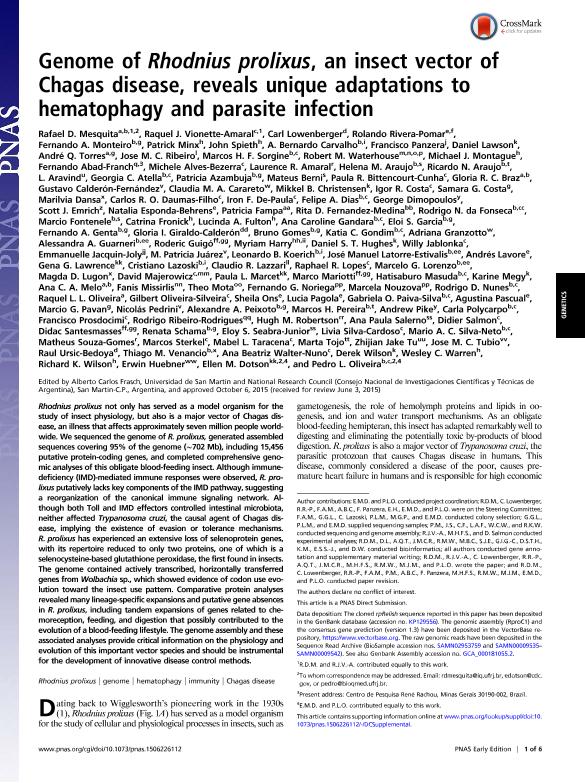Artículo
Genome of Rhodnius prolixus, an insect vector of Chagas disease, reveals unique adaptations to hematophagy and parasite infection
Calderón Fernández, Gustavo Mario ; Esponda Behrens, Natalia Irene
; Esponda Behrens, Natalia Irene ; Juarez, Marta Patricia
; Juarez, Marta Patricia ; Latorre Estivalis, Jose Manuel
; Latorre Estivalis, Jose Manuel ; Lavore, Andres Esteban
; Lavore, Andres Esteban ; Lazzari, Claudio Ricardo
; Lazzari, Claudio Ricardo ; Lorenzo, Marcelo Gustavo
; Lorenzo, Marcelo Gustavo ; Ons, Sheila
; Ons, Sheila ; Pagola, Lucia Elena
; Pagola, Lucia Elena ; Pascual, Agustina
; Pascual, Agustina ; Pedrini, Nicolás
; Pedrini, Nicolás ; Sterkel, Marcos
; Sterkel, Marcos
 ; Esponda Behrens, Natalia Irene
; Esponda Behrens, Natalia Irene ; Juarez, Marta Patricia
; Juarez, Marta Patricia ; Latorre Estivalis, Jose Manuel
; Latorre Estivalis, Jose Manuel ; Lavore, Andres Esteban
; Lavore, Andres Esteban ; Lazzari, Claudio Ricardo
; Lazzari, Claudio Ricardo ; Lorenzo, Marcelo Gustavo
; Lorenzo, Marcelo Gustavo ; Ons, Sheila
; Ons, Sheila ; Pagola, Lucia Elena
; Pagola, Lucia Elena ; Pascual, Agustina
; Pascual, Agustina ; Pedrini, Nicolás
; Pedrini, Nicolás ; Sterkel, Marcos
; Sterkel, Marcos
Fecha de publicación:
16/11/2015
Editorial:
National Academy of Sciences
Revista:
Proceedings of the National Academy of Sciences of The United States of America
ISSN:
0027-8424
Idioma:
Inglés
Tipo de recurso:
Artículo publicado
Clasificación temática:
Resumen
Rhodnius prolixus not only has served as a model organism for the study of insect physiology, but also is a major vector of Chagas disease, an illness that affects approximately seven million people worldwide. We sequenced the genome of R. prolixus, generated assembled sequences covering 95% of the genome (?702 Mb), including 15,456 putative protein-coding genes, and completed comprehensive genomic analyses of this obligate blood-feeding insect. Although immunedeficiency (IMD)-mediated immune responses were observed, R. prolixus putatively lacks key components of the IMD pathway, suggesting a reorganization of the canonical immune signaling network. Although both Toll and IMD effectors controlled intestinal microbiota, neither affected Trypanosoma cruzi, the causal agent of Chagas disease, implying the existence of evasion or tolerance mechanisms. R. prolixus has experienced an extensive loss of selenoprotein genes, with its repertoire reduced to only two proteins, one of which is a selenocysteine-based glutathione peroxidase, the first found in insects. The genome contained actively transcribed, horizontally transferred genes from Wolbachia sp., which showed evidence of codon use evolution toward the insect use pattern. Comparative protein analyses revealed many lineage-specific expansions and putative gene absences in R. prolixus, including tandem expansions of genes related to chemoreception, feeding, and digestion that possibly contributed to the evolution of a blood-feeding lifestyle. The genome assembly and these associated analyses provide critical information on the physiology and evolution of this important vector species and should be instrumental for the development of innovative disease control methods.
Palabras clave:
CHAGAS DISEASE
,
GENOME
,
HEMATOPHAGY
,
IMMUNITY
,
RHODNIUS PROLIXUS
Archivos asociados
Licencia
Identificadores
Colecciones
Articulos(CCT - LA PLATA)
Articulos de CTRO.CIENTIFICO TECNOL.CONICET - LA PLATA
Articulos de CTRO.CIENTIFICO TECNOL.CONICET - LA PLATA
Articulos(CIC)
Articulos de CENTRO DE INVEST.CARDIOVASCULARES (I)
Articulos de CENTRO DE INVEST.CARDIOVASCULARES (I)
Articulos(INIBIOLP)
Articulos de INST.DE INVEST.BIOQUIMICAS DE LA PLATA
Articulos de INST.DE INVEST.BIOQUIMICAS DE LA PLATA
Articulos(SEDE CENTRAL)
Articulos de SEDE CENTRAL
Articulos de SEDE CENTRAL
Citación
Calderón Fernández, Gustavo Mario; Esponda Behrens, Natalia Irene; Juarez, Marta Patricia; Latorre Estivalis, Jose Manuel; Lavore, Andres Esteban; et al.; Genome of Rhodnius prolixus, an insect vector of Chagas disease, reveals unique adaptations to hematophagy and parasite infection; National Academy of Sciences; Proceedings of the National Academy of Sciences of The United States of America; 112; 48; 16-11-2015; 14936-14941
Compartir
Altmétricas



